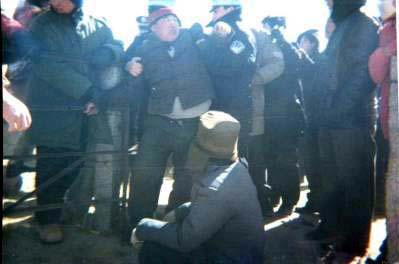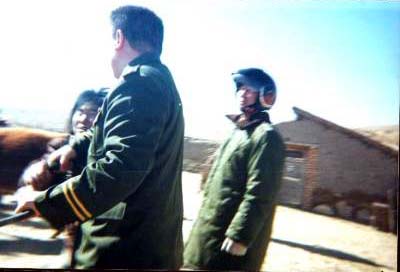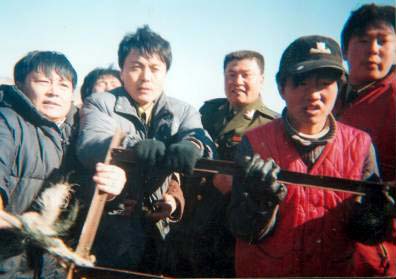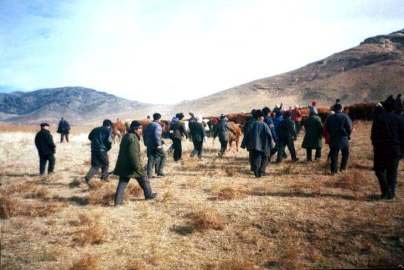| |
by Oliver Dupuis,
European Parliament

Many ethnic Mongolian herders were beaten up and arrested
by the police
during the displacement in eastern Inner Mongolia’s Bagarin
Right Banner.

Mongolian herders who resisted the coerced displacement
have been treated brutally by the police in Inner Mongolia.

Infrastructure for livestock husbandry has been dismantled
by the police if the ethnic herders did not want to give up
their traditional nomadic lifestyle.

During the forced relocations, the authorities have confiscated
ethnic Mongolian herders’ livestock and other property
in the
pretext of “recovering the grassland eco-system”.
[
Brussels, 22 May 2002. ] Since it was invaded and occupied
by the People’s Republic of China in 1947, Southern Mongolia
has been subject to a brutal policy of colonisation by the
Beijing authorities. The populations of this country, traditionally
nomadic and dependent on cattle-rearing, have been the victims
of an extremely cruel political and cultural oppression that
has led to the death of tens of thousands of people. From
an economic point of view, Beijing has imposed a sedentary
life, based on intensive farming of the land, on the Mongolian
populations. With the result that 81% of the pasture land
has been turned into desert.
In the face of this ecological and human disaster, during
the last few years the Beijing authorities have imposed a
policy of so-called "environmental immigration"
(Sheng Tai Yi Min in Chinese), whose official purpose is to
let the pasture land lie fallow and to protect the ecosystem,
but whose first concrete result has been to move the Mongolian
populations who still lived in their ancestral lands towards
urban or agricultural areas inhabited largely by peoples of
Han origin. Over 160,000 Mongols have already been forced
to leave their homelands and to settle in regions where they
have nothing.
Statement by Olivier Dupuis, Member of the European Parliament
(Radical):
“Southern Mongolia, better known as Inner Mongolia,
annexed by the People’s Republic of China in 1947 following
an agreement between Stalin and Mao Tse-tung to divide up
Mongolia, has hardly ever had the honour, unlike Tibet, of
front-page coverage in the Western media. Yet in Southern
Mongolia, as in Tibet, the policy of mass colonisation implemented
by the Beijing authorities has been tragic from a human point
of view and disastrous from an environmental point of view.
Hundreds of thousands of victims among the Mongolian population,
an unprecedented ecological disaster in a fragile ecosystem
that the Mongols had always managed to protect before the
arrival of the Han settlers, and finally a further human tragedy
with the mass displacement of the Mongolian populations who
were already a minority in the Chinese-dominated urban centres.”
Question to the Commission:
“Is the Commission aware of the dramatic consequences
of the policy of intensive exploitation of the land in Southern
Mongolia and the tragic human consequences of the so-called
“environmental immigration policy”? What concrete
action does the Commission intend to take to persuade the
Beijing authorities to abandon their policy of colonisation
of Southern Mongolia, the cause of the ecological disaster
and of the human tragedy of the Mongolian peoples? In particular,
does the Commission intend to denounce the policy of intensive
exploitation of the land and to back the demands for the return
of the areas expropriated from their rightful occupants?”
www.radicalparty.org
|





